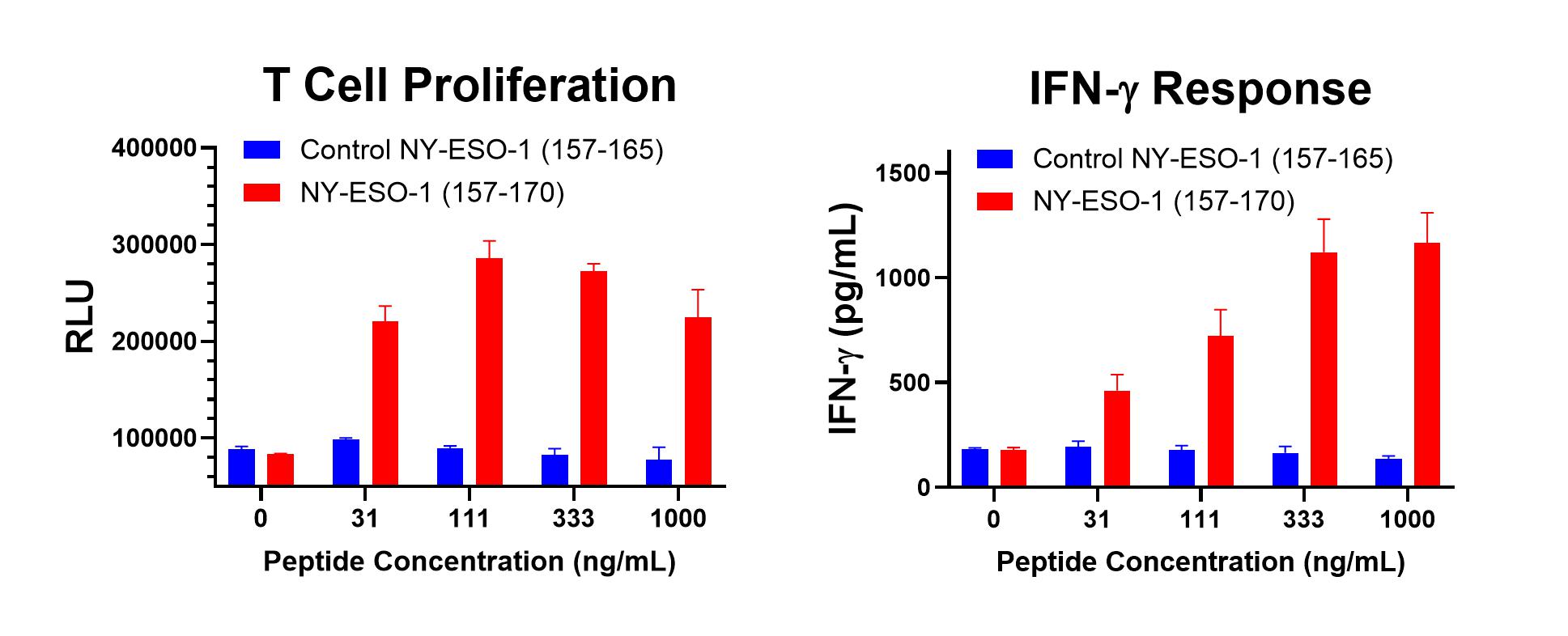CD4+ T Cells Specific for NY-ESO-1
Our scientists were among the first to develop custom antigen-specific T cells for research use and have created them against a diverse range of targets, including viral, tumor, and self-antigens.
We’re now developing the next generation of antigen-specific T cells (both CD4+ and CD8+) to target some of today’s most prevalent and challenging diseases. More on that below. But first, a primer on antigen-specific T cells.
The Role of Antigen-Specific T Cells in Disease Research and Treatment
T cells are a major player in the immune response in various diseases, including cancer and pathogenic infections, and are mediators in inflammation and autoimmunity. A large body of research has been conducted over the past few decades to manipulate T cell responses, leading to many clinical strategies including cancer vaccines, T cell adoptive therapy, CAR-T therapy, immune-oncology, and the use of regulatory T cells for autoimmune diseases.
Antigen-specific T cells are an important tool in T cell biology research and potency assays. Investigators can isolate them directly from the disease site (e.g., tumor-infiltrating lymphocytes (TIL) or inflammatory lesion infiltrate populations), but these procedures often yield a limited number of cells due to low cell frequency and lack of robust isolation methods.
Alternatively, antigen-specific T cells can be generated in vitro using antigen-presenting cells pulsed with whole antigens or peptides. However, this process is often time-consuming with a low success rate.
About Ignyte Bio’s Antigen-Specific T Cells
Ignyte Bio offers antigen-specific T cells for research use you can rely on.
- Typically generated using multiple in vitro stimulations with peptide antigens
- Not immortalized or genetically modified, so they more closely mimic physiological T cells
- Specificity analyzed using the cognate peptide/MHC tetramer binding as well as interferon-gamma (IFN-γ) and cytotoxicity assays for CD8 products, or antigen-specific proliferation assay for CD4 products
Announcing Ignyte Bio’s Newest Antigen-Specific T Cells : anti-NY-ESO-1 CD4+ T Cells
NY-ESO-1 (New York esophageal squamous cell carcinoma 1), an 18 k-Da protein, is a well-known cancer testis antigen (CTAs). It is expressed in a wide range of tumor types, including neuroblastoma, myeloma, metastatic melanoma, synovial sarcoma, bladder cancer, esophageal cancer, hepatocellular cancer, head and neck cancer, non-small cell lung cancer, ovarian cancer, prostate cancer, and breast cancer. In contrast, its expression in normal tissues is limited to germ cells and placental cells (Thomas et. al., 2018).
Both cellular (T cell) and humoral (antibody) responses to NY-ESO-1 have been observed in cancer patients. CD8+ T cells that recognize NY-ESO-1 epitopes have been characterized. Several of these epitopes have shown considerable promise in cancer immunotherapy. CD8+ T cells specific for one epitope in particular: HLA-A*0201-restricted NY-ESO-1157-165 (SLLMWITQC), have been involved in several clinical trials. To support your research, Ignyte Bio has previously offered anti-NY-ESO-1-specific CD8+ T cells against this peptide.
Helper CD4+ T cells play a central role in initiating and maintaining the host immune response against cancer. Presence of high titers of NY-ESO-1 antibodies frequently detected in patients with NY-ESO-1+ tumors (Stockert et. al, 1998) suggested that specific CD4+ T cell responses may also be elicited in these patients. Several MHC class II-restricted CD4 T cell epitopes have been characterized. One of these epitopes, NY-ESO-1157-170 (SLLMWITQCFLPVF) is restricted by HLA-DP*04, a prevalent MHC class II present in approximately 43-70% of Caucasians (Zeng et. al., 2001). Interestingly, this longer peptide (157-170) also contains the 9-mer HLA-A*0201-restricted epitope 157-165 (SLLMWITQC) described above.
Ignyte Bio now offers the NY-ESO-1157-170 -specific CD4 T cells for your research use. Functional data (antigen-specific T cell proliferation and IFN-gamma secretion) is presented in the figure below.

Figure 1. Antigen-Specific CD4 T Cell Proliferation and IFN-γ Data.
Freshly thawed anti-NY-ESO-1 T cells were plated at 2 x 104 cells/well in the presence of 2 x 104 mitomycin-C inactivated HLA-DP4+ allogeneic B-LCL cells and different concentrations of NY-ESO-1157-170 (SLLMWITQCFLPVF) or NY-ESO-1 157-165 (SLLMWITQC) control peptide in a 96-well round bottom plate. After 4 days of incubation a t 37oC, 5% CO2, cell proliferation was analyzed using CellTiter-Glo®2.0 luminescent assay (Promega, Madison, WI). Relative Luminescence Unit (RLU) values are plotted vs. peptide concentration (left figure). In addition, concentration of IFN-g secreted was analyzed from culture supernatant from each well using the Lumit® IFN-g (human) Immunoassay (Promega, Madison, WI). IFN-g concentration is plotted vs peptide concentration (right figure).
